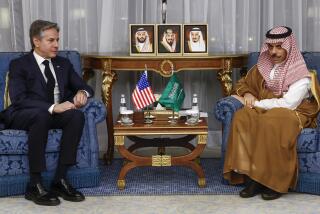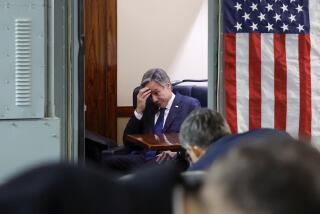Crack of Light in the Mideast
- Share via
When U.S. special envoy Anthony C. Zinni was yanked back from the Middle East last month, civil life in the region seemed on the verge of collapse. Palestinian suicide bombings and Israeli army attacks had killed dozens of people, and Israeli military assaults inside Palestinian territory were relentless. Now, only three weeks later, the Bush administration is seizing on a reduction in the violence and sending the retired Marine Corps general back to seek a cease-fire.
The calm could deteriorate just as swiftly as it returned. Still, one reason for comparative optimism is Palestinian Authority President Yasser Arafat’s speech soon after Zinni’s recall. Arafat, often criticized by Israelis for preaching peace in English and war in Arabic, demanded in an Arabic television address that Palestinians halt all attacks on Israelis. In response, the terrorist group Hamas, which claimed responsibility for several suicide bombings inside Israel before and during Zinni’s three weeks of meetings with Israeli and Palestinian leaders, said it would stop attacks inside Israel. Hamas did not promise to suspend attacks in the occupied territories, and another major terrorist group, Islamic Jihad, has not renounced attacks.
Still, the lessening of violence and Arafat’s arrest of dozens of Hamas and Islamic Jihad militants, as well as the closing of a number of those groups’ offices, have encouraged Washington sufficiently to send Zinni back to meet with representatives of Arafat and Israeli Prime Minister Ariel Sharon. The envoy could wind up shuttling between the two leaders themselves.
The United States was one of numerous countries demanding that Arafat do more to crack down on the terrorist groups. Zinni should encourage Arafat to keep up the pressure on the militants and arrest those who Israel has demanded be taken into custody. If he doesn’t, Israel will try to make the arrests itself. The emissary should also urge Israel to loosen its internal travel bans on Palestinians, which have devastated the already weak Palestinian economy.
Sharon, whose government last month declared Arafat “irrelevant,” decided he was important enough after all to bar from attending Christmas Mass in Bethlehem. The ban gave the government a deserved black eye around the world and, worse, negated an opportunity to acknowledge that Arafat was doing what Israel demanded when he arrested members of Hamas and Islamic Jihad. This week Sharon blocked Israel’s president from proposing a cease-fire to the Palestinian Legislative Council, apparently fearing it would be a public relations win for Arafat.
Zinni’s mission is tightly limited, which it should be. His goals are a cease-fire after 14 months of renewed violence, more arrests of Islamic militants and an easing of travel bans on Palestinians. Such modest ambition increases the chances of success, although the volatility and history of the Middle East call for caution. The ultimate goal is a return to full-fledged peace talks as outlined last year by the committee headed by former U.S. Sen. George J. Mitchell. For now, it would be enough to back away from the brink.
More to Read
Sign up for Essential California
The most important California stories and recommendations in your inbox every morning.
You may occasionally receive promotional content from the Los Angeles Times.













